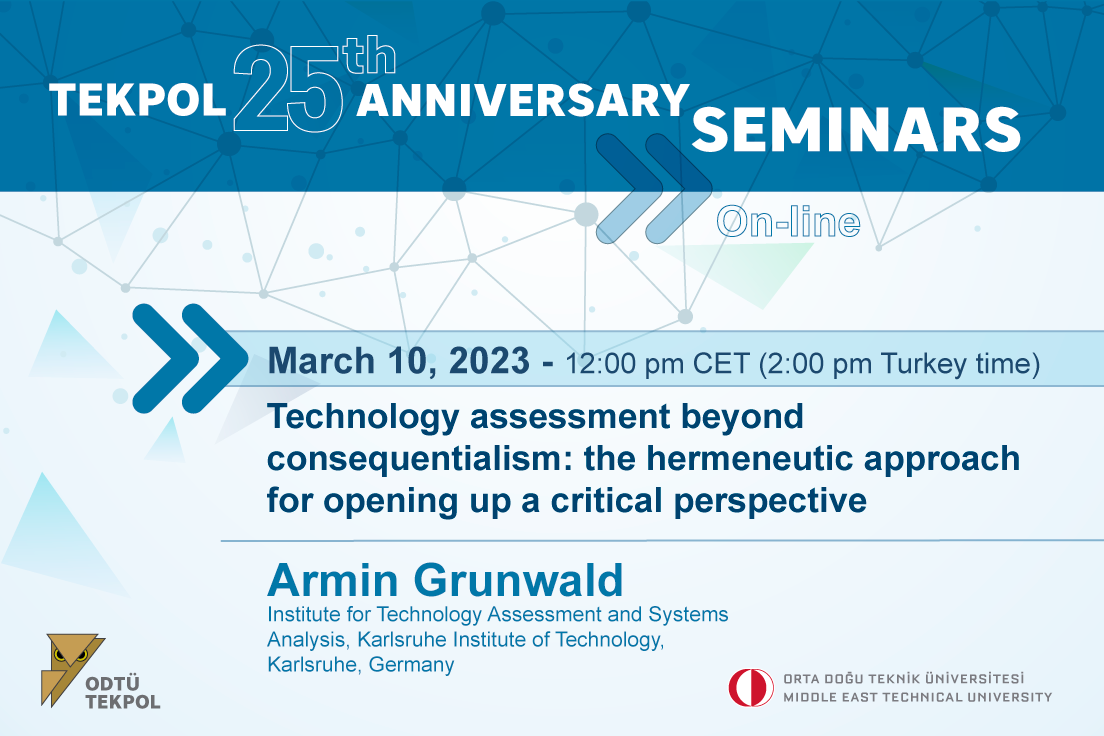TEKPOL 25th Year Anniversary Seminars_ArminGrunwald_10032023
Last Updated:
- English
- Türkçe
Dear TEKPOL Partners,
This year we will be celebrating the 25th Anniversary of TEKPOL's foundation. Therefore we believe it will be a valuable opportunity to reconnect with our partners all over the globe working in the field of science and technology policy making and decided to host a series of online seminars in the spring semester of 2023 academic year.
Our second guest will be Armin Grunwald, from Institute for Technology Assessment and Systems Analysis, at the Karlsruhe Institute of Technology, Germany. His presentation title is; Technology assessment beyond consequentialism: the hermeneutic approach for opening up a critical perspective.
The seminar will be held on 10 March (Friday) 2023, at 12:00 CET (2:00 pm Turkey time) , through ZOOM. The Zoom link will be shared with the registered participants before the session.
The moderation of the seminar will be conducted by Assist. Prof. Dr. Arsev Umur Aydinoglu from METU TEKPOL.
Registration is mandatory and the form can be reached through this link:
https://forms.gle/jFiWVJE1KErnkVhe6
It is possible to register until Thursday evening before the seminar (9 March 2023)
Kind Regards,
TEKPOL, Science and Technology Policy Research Center
About Armin Grunwald:
Armin Grunwald is director of the Institute for Technology Assessment and Systems Analysis (ITAS) at the Karlsruhe Institute of Technology (KIT) in Karlsruhe, Germany, since 1999. Since 2002 he is also director of the Office of Technology Assessment at the German Bundestag (TAB). Additionally, Armin Grunwald is a Full Professor of Philosophy and Ethics of Technology at KIT, since 2007. Armin Grunwald's main working areas include: theory and methodology of technology assessment, ethics of new technology, philosophy of science, concepts of sustainable development, theory and practice of inter- and transdisciplinary research. Armin Grunwald studied physics at the universities Münster and Cologne. He received the diploma in Physics in 1984, and the PhD in 1987 with a thesis on thermal transport processes in semiconductors at Cologne University. From 1987-1991 he acted as software engineer and systems specialist in a company. Armin Grunwald was a researcher at the DLR (German Aerospace Center) in the field of technology assessment, from 1991 to 1995. In 1996 he was appointed vice director of the European Academy Bad Neuenahr-Ahrweiler. In 1998 he received his habilitation at the faculty of social sciences and philosophy at Marburg University with a study on culturalistic planning theory.
About the Seminar:
Technology assessment (TA) aiming at providing orientation for society and policymaking in and for the technological advance needs anticipating and evaluating possible, probable, desired and undesired, plausible and feared consequences of new technology. Usually, this happens in the consequentialist paradigm of, for example, prediction, simulation, and scenario-building. Since the beginning of this century, however, the consequentialist approach of TA has been seriously challenged by several new and emerging sciences and technologies, on the one hand, and challenges such as climate change and the pandemic, on the other. In the proposed hermeneutic extension of TA, narratives of the future such as scenarios, visions and expectations are not regarded as statements about possible or probable future developments and events. Instead, they are considered as stories created and disseminated by actors today, debated and contested in today's discourses, inspired by current knowledge and creativity, current diagnoses and observations, hopes and fears as well as current interests and values. Hence, their analysis can tell something about today's society, today's attitudes and implicit convictions up to Zeitgeist issues. In this perspective, the hermeneutic approach opens up a critical perspective. In the presentation, this will be exemplified at the occasion of futures developed by using data-based models and quantitative scenarios.
















